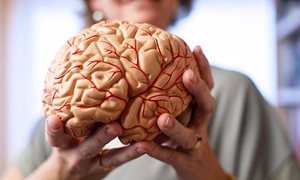
Neurologist Bas Bloem of Radboud university medical center receives this year’s Stevin Prize of the Dutch Research Council (NWO). The Stevin Award is the highest distinction in science for a researcher in the Netherlands who has achieved particular success in the area of knowledge utilization for society. Bas Bloem is an expert in the field of Parkinson's disease and is receiving this award for the social impact of his research into this common and debilitating disorder.
Bas Bloem (1967), professor of neurological movement disorders at Radboud university medical center, is an internationally recognized expert in the field of Parkinson's disease. Bloem's efforts in the past decades have been instrumental in placing Parkinson’s disease, an incurable brain disorder, high on the scientific and social agenda. Bloem is constantly looking for new ways to slow down and prevent Parkinson's disease, and to maintain a good quality of life for patients and their loved ones for as long as possible.
He developed ParkinsonNet, an innovative care model in which networks of specifically trained healthcare professionals work together to provide optimal Parkinson's care. Among others, multidisciplinary care (including physiotherapy and speech therapy), exercise and a healthy lifestyle play an important role. Following a nationwide implementation in the Netherlands, the model has now also been introduced in several other countries. The committee that awards the Stevin Prize winners calls Bloem an out-of-the-box thinker with an impressive international network. He develops innovative products with technology companies to improve Parkinson's care. Together with three others, he wrote the book “Ending Parkinson's Disease: A Prescription for Action” to generate more attention to the need for prevention. His educational video for the University of the Netherlands was viewed almost a million times.
The Dutch Research Council committee praises Bloem as a committed professor who is committed to building bridges between science and the patient and family. With the Stevin Prize (2.5 million euros), Bloem is expected to make important further progress in the development of personalized, integrated medicine. In addition, Bloem wants to use the prize for new groundbreaking research focused on the prevention of Parkinson's disease. Finally, Bloem wants to educate young researchers on how to better valorize scientific knowledge.
Bas Bloem: ‘I am very honored with this Prize. I may be the one receiving it, but above all I see it as a team prize. It is true recognition for the work that we do with our wonderful group at Radboud university medical center in Nijmegen. Together, we now want to use the award for "high-risk, high-reward" research, in which we will focus for the first time on the actual prevention of Parkinson's disease. And we're going to do that with a completely new study design, where all participants will be treated and assessed completely remotely.’
Two laureates from Nijmegen
Six scientists will receive the highest awards in Dutch science this year, the Spinoza and Stevin Prizes. Remarkably, one of the Spinoza Prizes goes to a researcher from Radboud University. As a mathematical physicist, Radboud University researcher Klaas Landsman investigates such topics as chance, determinism and emergence. It is rare for two such grants to go to the same university in a single year. Read more about Klaas Landsman's work on Radboud University's website.
Researchers receive the grants for their outstanding, groundbreaking and inspiring work. To receive the Prize, the researchers must be nominated. In both awards, the quality of the researcher is paramount; where the Spinoza Prize emphasizes scientific work and fundamental issues, the Stevin Prize honors primarily social impact. The other laureates are Thea Hilhorst, Corné Pieterse and Ignas Snellen (Spinoza) and Tanja van der Lippe (Stevin).
The laureates will each receive an amount of 2.5 million euros. They are free to choose how they will spend the money, as long as it is related to scientific research and/or activities that utilize knowledge. The festive award ceremony will take place on Wednesday, October 5, 2022. During the ceremony the laureates will give an insight into the content of their research and it will become clear what they want to use the premium for.
-
Want to know more about these subjects? Click on the buttons below for more news.
More information
Pauline Dekhuijzen

wetenschaps- en persvoorlichter
Related news items

The future of laboratory animal research More attention to living conditions of laboratory animals
16 May 2022 On May 9, a meeting took place at the Radboudumc as a result of the launch of the Dutch Transparency Agreement on Animal Testing. The Radboudumc is one of the twenty signatories and has thus committed itself to openly and transparently communicate its vision and policy with regard to animal testing. read more
Aerobe exercise has a positive effect on brain function in Parkinson's disease patients
18 January 2022 Radboudumc researchers have shown that the brain function of patients with Parkinson's disease improved with regular exercise, which seems to strengthen the connections between different brain areas, while inhibiting brain shrinkage. read more
Tiny blood vessels, big problems Radboudumc receives grant for international collaboration
3 November 2021 The Radboudumc, together with the University of Cambridge, receives a grant of €1.8M from three collaborating cardiac foundations for international research into the small blood vessels in the brain. This study will be led by Neurologist Frank-Erik de Leeuw and internist Niels Riksen. read more


